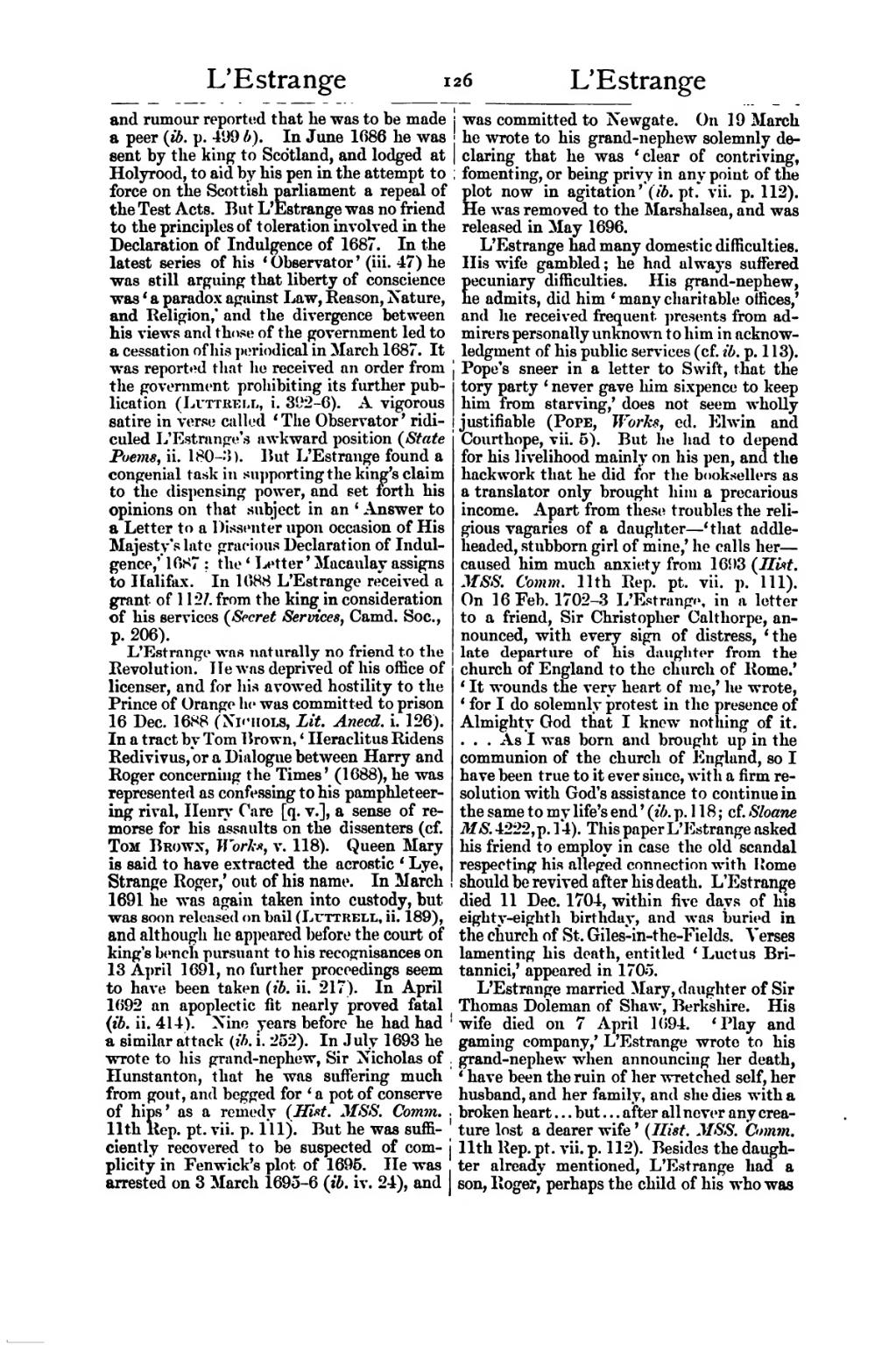and rumour reported that he was to be made a peer (ib. p. 499 b). In June 1686 he was sent by the king to Scotland, and lodged at Holyrood, to aid by his pen in the attempt to force on the Scottish parliament a repeal of the Test Acts. But L'Estrange was no friend to the principles of toleration involved in the Declaration of Indulgence of 1687. In the latest series of his ‘Observator’ (iii. 47) he was still arguing that liberty of conscience was ‘a paradox against Law, Reason, Nature, and Religion,’ and the divergence between his views and those of the government led to a cessation of his periodical in March 1687. It was reported that he received an order from the government prohibiting its further publication (Luttrell, i. 392–6). A vigorous satire in verse called ‘The Observator’ ridiculed L'Estrange's awkward position (State Poems, ii. 180–3). But L'Estrange found a congenial task in supporting the king's claim to the dispensing power, and set forth his opinions on that subject in an ‘Answer to a Letter to a Dissenter upon occasion of His Majesty's late gracious Declaration of Indulgence,’ 1687; the ‘Letter’ Macaulay assigns to Halifax. In 1688 L'Estrange received a grant of 112l. from the king in consideration of his services (Secret Services, Camd. Soc., p. 206).
L'Estrange was naturally no friend to the Revolution. He was deprived of his office of licenser, and for his avowed hostility to the Prince of Orange he was committed to prison 16 Dec. 1688 (Nichols, Lit. Anecd. i. 126). In a tract by Tom Brown, ‘Heraclitus Ridens Redivivus, or a Dialogue between Harry and Roger concerning the Times’ (1688), he was represented as confessing to his pamphleteering rival, Henry Care [q. v.], a sense of remorse for his assaults on the dissenters (cf. Tom Brown, Works, v. 118). Queen Mary is said to have extracted the acrostic ‘Lye, Strange Roger,’ out of his name. In March 1691 he was again taken into custody, but was soon released on bail (Luttrell, ii. 189), and although he appeared before the court of king's bench pursuant to his recognisances on 13 April 1691, no further proceedings seem to have been taken (ib. ii. 217). In April 1692 an apoplectic fit nearly proved fatal (ib. ii. 414). Nine years before he had had a similar attack (ib. i. 252). In July 1693 he wrote to his grand-nephew, Sir Nicholas of Hunstanton, that he was suffering much from gout, and begged for ‘a pot of conserve of hips’ as a remedy (Hist. MSS. Comm. 11th Rep. pt. vii. p. 111). But he was sufficiently recovered to be suspected of complicity in Fenwick's plot of 1695. He was arrested on 3 March 1695–6 (ib. iv. 24), and was committed to Newgate. On 19 March he wrote to his grand-nephew solemnly declaring that he was ‘clear of contriving, fomenting, or being privy in any point of the plot now in agitation’ (ib. pt. vii. p. 112). He was removed to the Marshalsea, and was released in May 1696.
L'Estrange had many domestic difficulties. His wife gambled; he had always suffered pecuniary embarrassments. His grand-nephew, he admits, did him ‘many charitable offices,’ and he received frequent presents from admirers personally unknown to him in acknowledgment of his public services (cf. ib. p. 113). Pope's sneer in a letter to Swift, that the tory party ‘never gave him sixpence to keep him from starving,’ does not seem wholly justifiable (Pope, Works, ed. Elwin and Courthope, vii. 5). But he had to depend for his livelihood mainly on his pen, and the hackwork that he did for the booksellers as a translator only brought him a precarious income. Apart from these troubles the religious vagaries of a daughter—‘that addle-headed, stubborn girl of mine,’ he calls her—caused him much anxiety from 1693 (Hist. MSS. Comm. 11th Rep. pt. vii. p. 111). On 16 Feb. 1702–3 L'Estrange, in a letter to a friend, Sir Christopher Calthorpe, announced, with every sign of distress, ‘the late departure of his daughter from the church of England to the church of Rome.’ ‘It wounds the very heart of me,’ he wrote, ‘for I do solemnly protest in the presence of Almighty God that I knew nothing of it. … As I was born and brought up in the communion of the church of England, so I have been true to it ever since, with a firm resolution with God's assistance to continue in the same to my life's end’ (ib. p. 118; cf. Sloane MS. 4222, p. 14). This paper L'Estrange asked his friend to employ in case the old scandal respecting his alleged connection with Rome should be revived after his death. L'Estrange died 11 Dec. 1704, within five days of his eighty-eighth birthday, and was buried in the church of St. Giles-in-the-Fields. Verses lamenting his death, entitled ‘Luctus Britannici,’ appeared in 1705.
L'Estrange married Mary, daughter of Sir Thomas Doleman of Shaw, Berkshire. His wife died on 7 April 1694. ‘Play and gaming company,’ L'Estrange wrote to his grand-nephew when announcing her death, ‘have been the ruin of her wretched self, her husband, and her family, and she dies with a broken heart … but … after all never any creature lost a dearer wife’ (Hist. MSS. Comm. 11th Rep. pt. vii. p. 112). Besides the daughter already mentioned, L'Estrange had a son, Roger, perhaps the child of his who was
